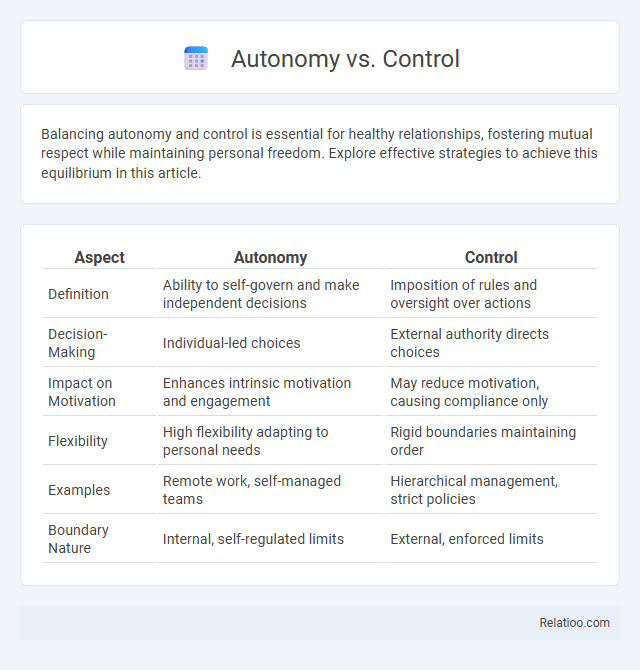Balancing autonomy and control is essential for healthy relationships, fostering mutual respect while maintaining personal freedom. Explore effective strategies to achieve this equilibrium in this article.
Table of Comparison
| Aspect | Autonomy | Control |
|---|---|---|
| Definition | Ability to self-govern and make independent decisions | Imposition of rules and oversight over actions |
| Decision-Making | Individual-led choices | External authority directs choices |
| Impact on Motivation | Enhances intrinsic motivation and engagement | May reduce motivation, causing compliance only |
| Flexibility | High flexibility adapting to personal needs | Rigid boundaries maintaining order |
| Examples | Remote work, self-managed teams | Hierarchical management, strict policies |
| Boundary Nature | Internal, self-regulated limits | External, enforced limits |
Introduction to Autonomy vs Control
Autonomy vs Control explores the balance between individual self-governance and external regulation in organizational and psychological contexts. Autonomy emphasizes personal freedom, creativity, and intrinsic motivation, while control involves structured oversight and adherence to rules. Understanding this dynamic is crucial for optimizing performance, satisfaction, and innovation within teams and systems.
Defining Autonomy and Control
Autonomy refers to an individual's capacity to make independent decisions and regulate their own actions without external influence, emphasizing self-governance and personal freedom. Control involves the power or authority exerted by an external entity to direct or restrict behaviors, often prioritizing order and compliance. Defining autonomy and control highlights the tension between self-directed motivation and externally imposed regulation within organizational and psychological contexts.
Historical Context of Autonomy and Control
The historical context of autonomy and control reveals a dynamic interplay rooted in the evolution of governance, technology, and social structures since the Industrial Revolution. Early industrial societies emphasized rigid control mechanisms to enhance productivity, while later movements toward individual rights expanded autonomy in political and personal spheres. Your understanding of this historical shift helps illuminate ongoing debates about balancing self-governance with institutional oversight in modern contexts.
Psychological Perspectives on Autonomy
Psychological perspectives on autonomy emphasize the essential role of self-determination in motivation, well-being, and personal growth, highlighting the balance between autonomy and control as crucial for optimal functioning. You experience greater satisfaction and psychological health when your actions align with internal values rather than external pressures or rigid control mechanisms. Research in self-determination theory underscores autonomy as a fundamental human need that supports intrinsic motivation and resilience against stress.
The Benefits of Control in Organizations
Control in organizations ensures consistent performance by establishing clear guidelines and expectations, reducing uncertainty in complex environments. Your team gains improved coordination and accountability through structured processes, which enhances productivity and minimizes risks. Effective control mechanisms enable timely corrective actions, sustaining organizational stability and supporting strategic goals.
The Balance Between Autonomy and Control
Achieving the balance between autonomy and control involves empowering individuals with the freedom to make decisions while maintaining necessary oversight to ensure alignment with organizational goals. Effective leadership fosters trust by setting clear boundaries and providing support, enabling autonomy to drive innovation and motivation without compromising accountability. Optimizing this balance enhances productivity, job satisfaction, and overall performance within teams and enterprises.
Impact on Employee Motivation
Autonomy significantly enhances employee motivation by fostering a sense of ownership and intrinsic engagement in tasks, leading to higher productivity and job satisfaction. Excessive control stifles creativity and reduces motivation, as employees may feel micromanaged and undervalued. A balanced approach, where autonomy is supported by clear guidelines and accountability, maximizes motivation and drives optimal performance.
Autonomy vs Control in Decision-Making
Autonomy in decision-making emphasizes individual freedom to choose actions based on personal values and preferences, fostering creativity and motivation. Control, however, relies on structured oversight and external rules to ensure consistency, accountability, and risk management within organizations. Balancing autonomy and control is essential for optimizing performance, allowing flexibility while maintaining necessary boundaries and compliance.
Case Studies in Different Industries
Case studies in different industries reveal that striking the right balance between autonomy and control can significantly impact organizational performance. In tech companies, increased employee autonomy fosters innovation and agility, while in manufacturing, structured control ensures quality and safety compliance. Your approach should consider industry-specific demands, leveraging autonomy to enhance creativity without compromising essential regulatory and operational controls.
Future Trends: Shifting Towards Autonomy or Control?
Future trends in technology and organizational management indicate a growing shift towards autonomy as AI and machine learning enable decentralized decision-making processes, enhancing efficiency and innovation. However, sectors with high regulatory demands, such as finance and healthcare, maintain a strong preference for control systems to ensure compliance and risk management. The balance between autonomy and control will increasingly depend on context-specific factors, with hybrid models emerging to leverage the benefits of both approaches.

Infographic: Autonomy vs Control
 relatioo.com
relatioo.com